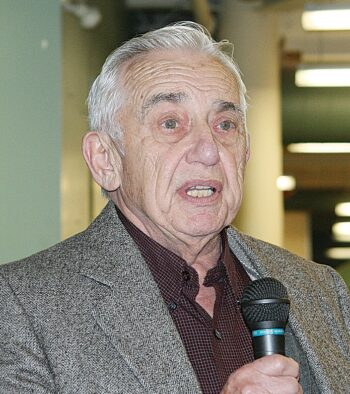Friedman, Arnold

Arnold Friedman was arrested during a raid in Slovakia and deported to Auschwitz in the spring of 1944, but survived his stay there. When the Auschwitz Camp was evacuated, Friedman ended up in the Flossenbürg Camp in northeastern Bavaria. Although all historians agree today that this camp had no facilities to mass murder inmates, in particular no homicidal gas chamber, Friedman disagreed with them by writing the following story in his 1972 book Death Was Our Destiny (pp. 49f.):
“I stayed in the hospital [at Flossenbürg Camp] for three days and had good food and a rest. […] Then one evening, a lot of S.S. walked into the room and they ordered us to follow them. They ordered us into a room and locked the door. I heard a noise like a snake hissing, and then I heard the slave laborers shouting, ‘They are gassing us!’ I smelled an awful odor. Some of the men dropped dead. The rest of us ran around the room cursing the Nazis.
I couldn’t take it much longer and ran to the door and took hold of the knob and tried to open it. The door was locked. The smell of the gas got stronger. I coughed, and choked, and put my face to the keyhole and kept inhaling a little air from the outside.
We had been in the room for about five minutes when I heard them outside the door talking in German. ‘Let’s see if some of them are still alive.’ I went away from the keyhole and the door opened. For some reason which I could never figure out, God had saved me from the gas chamber. The S.S. shouted for us to go out. There were only five of us still alive; sixty lay behind, dead. […]
Why hadn’t the S.S. murderers finished the job in the gas room? No, I couldn’t figure these things out.”
He couldn’t figure it out because he made up the whole story. That wasn’t the last time Friedman was caught lying. In 1985, he agreed to testify about his Auschwitz experiences at the first Zündel Trial. He and another testifier, Rudolf Vrba, were the only Holocaust witnesses ever to be cross-examined in a court of law by a skilled and skeptical interrogator. During his testimony, Friedman claimed the following, among other things (Rudolf 2020b, pp. 68, 69, 81):
“There was smoke belching from the crematories, and it gave us a constant smell – the crematories being close enough and low enough for the smoke to be dispersed through the camp rather than go straight up. […] Well, there was – the building that I described as a crematorium is a cottage-type low building with a short chimney protruding from it. At nighttime you saw the flames shooting above the chimney about a meter or two meters, depending on the particular time. There was smoke coming out, […] Well, it was the odour of burning flesh, and the flames were changing colours from yellow to a deep red on various occasions. […] We were discussing various things and this was part of the discussion of the guesswork we kids had in guessing that these were Hungarian transports because they have these type of flames, and these are Polish transports, they’re very skinny, […]”
Asked by the defense lawyer upon cross-examination whether he testified under oath that “skinny people” have “a different coloured flame” coming out of the crematorium chimney “than the fatter people,” Friedman confirmed, “That was an opinion, yes, an opinion we formed” (ibid., p. 82). A bit later, he added (ibid., p. 88):
“I remember we distinguished them [the skinny from the fat people], that this is a clear yellow flame as opposed to a vermilion or pink type of flame, and the odour and so on.”
Here we have doubly impossible nonsense that, first of all, no flames can come out of a crematorium chimney, and second, that the color of the flame with which people burn does not depend on their national origin or body weight. During cross-examination, when confronted with the fact that crematorium chimneys emit neither flames nor much smoke, Friedman eventually admitted that he didn’t really know any of that from personal experience, but that he had simply repeated what others had told him (ibid., p. 87):
“I don’t know if I would have listened to you. Some time I would have listened to other people, maybe I would have attached more credibility to your portion than theirs, but at the time I accepted theirs.”
When asked whether he ever heard rumors while in Auschwitz, Friedman answered: “Constantly” (ibid., p. 78), which means that he, as so many other witnesses, likely converted rumors and stories that he had heard into events that he claimed to have witnessed himself.

You need to be a registered user, logged into your account, and your comment must comply with our Acceptable Use Policy, for your comment to get published. (Click here to log in or register.)